Related Research Articles
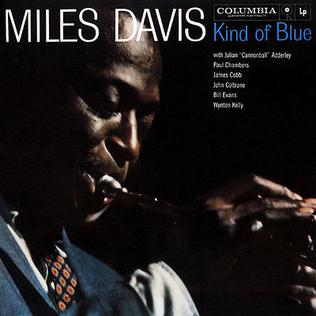
Kind of Blue is the fifth studio album released on Columbia, and twenty-eighth overall, by American jazz musician, trumpeter, composer, and bandleader Miles Davis. It was recorded on March 2 and April 22, 1959, at Columbia's 30th Street Studio in New York City, and released on August 17 of that same year by Columbia Records. For the recording, Davis led a sextet featuring saxophonists John Coltrane and Julian "Cannonball" Adderley, pianist Bill Evans, bassist Paul Chambers, and drummer Jimmy Cobb, with new band pianist Wynton Kelly appearing on one track – "Freddie Freeloader" – in place of Evans.

Ian Ernest Gilmore Evans was a Canadian–American jazz pianist, arranger, composer and bandleader. He is widely recognized as one of the greatest orchestrators in jazz, playing an important role in the development of cool jazz, modal jazz, free jazz, and jazz fusion. He is best known for his acclaimed collaborations with Miles Davis.

Miles Ahead is an album by Miles Davis that was released in October 1957 by Columbia Records. It was Davis' first collaboration with arranger Gil Evans following the Birth of the Cool sessions. Along with their subsequent collaborations Porgy and Bess (1959) and Sketches of Spain (1960), Miles Ahead is one of the most famous recordings of Third Stream, a fusion of jazz, European classical, and world musics. Davis played flugelhorn throughout.
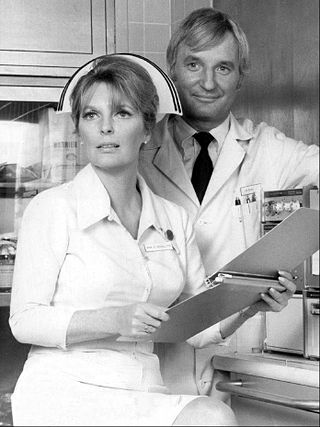
Robert William Troup Jr. was an American actor, jazz pianist, singer, and songwriter. He wrote the song "Route 66" and acted in the role of Dr. Joe Early with his wife Julie London in the television program Emergency! in the 1970s.

Julie London was an American singer and actress whose career spanned more than 40 years. A torch singer noted for her sultry, languid contralto vocals, London recorded over thirty albums of pop and jazz standards between 1955 and 1969. Her recording of "Cry Me a River", a track she introduced on her debut album, was inducted into the Grammy Hall of Fame in 2001. In addition to her musical notice, London was nominated for a Golden Globe Award in 1974 for her portrayal of nurse Dixie McCall in the television series Emergency!
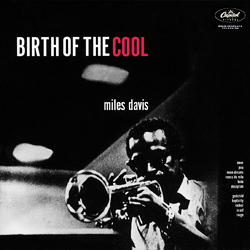
Birth of the Cool is a compilation album by American jazz trumpeter and bandleader Miles Davis, released in February 1957 by Capitol Records. It compiles eleven tracks recorded by Davis's nonet for the label over the course of three sessions during 1949 and 1950.

Filles de Kilimanjaro is a studio album by American jazz trumpeter Miles Davis. It was recorded in June and September 1968, and released on Columbia Records. It was released in the United Kingdom by the company's subsidiary Columbia (CBS) in 1968 and in the United States during February 1969. The album is a transitional work for Davis, who was shifting stylistically from acoustic recordings with his "second great quintet" to his electric period. Filles de Kilimanjaro was well received by contemporary music critics, who viewed it as a significant release in modern jazz. Pianist Chick Corea and bassist Dave Holland appear together on two tracks, their first participation on a Davis album.

Someday My Prince Will Come is the seventh studio album by Miles Davis for Columbia Records, catalogue CL 1656 and CS 8456 in stereo, released in 1961. Recorded at Columbia's 30th Street Studio in Manhattan, New York City, it marked the only Miles Davis Quintet studio recording session to feature saxophonist Hank Mobley.
"I Should Care" is a popular song with music by Axel Stordahl and Paul Weston and lyrics by Sammy Cahn, published in 1944. Cahn said that the title came to him by the time they played the first 4 bars. It first appeared in the MGM film Thrill of a Romance. The original recording by Ralph Flanagan and His Orchestra, with vocalists: Harry Prime and The Singing Winds was made at Manhattan Center, New York City, on July 18, 1952. It was released by RCA Victor Records as catalog number 20-4885 and by EMI on the His Master's Voice labels as catalog number B 10389.
Ernest Andrew Royal was a jazz trumpeter. His older brother was clarinetist and alto saxophonist Marshal Royal, with whom he appears on the classic Ray Charles big band recording The Genius of Ray Charles (1959).
Bernie Glow was an American trumpet player who specialized in jazz and commercial lead trumpet from the 1940s to 1970s.

John William Barber was an American jazz tubist. He is considered by many to be the first person to play tuba in modern jazz. He recorded with Miles Davis on the albums Birth of the Cool, Sketches of Spain, and Miles Ahead.
"(You'd Be So) Easy to Love" is a popular song written by Cole Porter for William Gaxton to sing in the 1934 Broadway show Anything Goes. However Gaxton was unhappy about its wide vocal range and it was cut from the musical. Porter re-wrote it for the 1936 film Born to Dance, where it was introduced by Eleanor Powell, James Stewart, and Frances Langford under its alternate title, "Easy to Love". The song was later added to the 1987 and 2011 revivals of Anything Goes under the complete title "You’d Be So Easy to Love".

About the Blues is an album by Julie London that was released in 1957. The album includes two songs written by Bobby Troup, her husband. Miles Davis recorded a version of one of them, "The Meaning of the Blues". The eighteen-piece band was arranged by Russell Garcia.
John E. Carisi was an American trumpeter and composer.
James Lawrence Buffington was an American jazz, studio, and classical hornist.

Joseph Barry Galbraith was an American jazz guitarist.
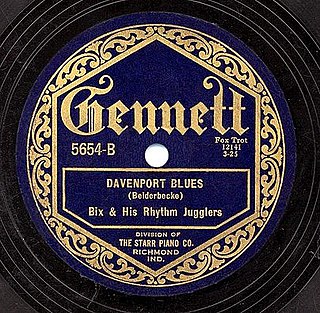
Davenport Blues is a 1925 song composed and recorded by Bix Beiderbecke and released as a Gennett 78. The song has become a jazz and pop standard.
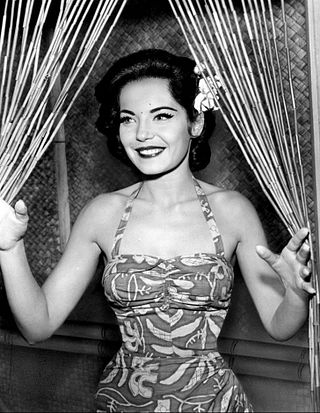
Linda Lawson was an American actress and singer.
References
- ↑ "Meaning of the Blues (1957)". jazzstandards.com. Retrieved 9 November 2014.
- ↑ "About the Blues (1957)". AllMusic . Retrieved 10 September 2018.